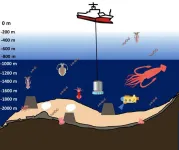(Press-News.org) Major reallocation of healthcare services during the COVID-19 pandemic meant that elective surgery in children with congenital heart disease (CHD) was significantly reduced, so that those needing urgent, lifesaving and emergency surgery could be treated. However, this prioritisation of the most severely ill children did not increase overall post-operative complications rates or death, a study led by the University of Bristol has shown.
The research, published in Open Heart, suggests that prioritising surgery for younger and more critically ill children may be appropriate when there is a sudden disruption of usual care. The findings could be used as a preparedness model for future pandemic-like scenarios, such as natural disasters or healthcare disruptions.
During the early days of the SARS-CoV-2 pandemic, pressure on healthcare resources affected hospitals to treat COVID-19 patients and to postpone elective procedures like specialist surgeries for CHD in children. However, CHD children require several repeat surgeries to maintain a healthy heart structure and function as they grow.
The aim of the study was to assess, in children under 16 years old, the impact on CHD procedures in England during different pandemic periods compared with the pre-pandemic period, to inform appropriate responses to future major healthcare disruptions. The researchers also investigated whether there was an increase in post procedure complication and post procedure death during these periods when compared to the pre-pandemic period.
The researchers analysed 26,270 procedures from 17,860 children between 1 January 2018 and 31 March 2022 in England, linking them to primary/secondary care data. The study period included pre-pandemic and pandemic phases, with the latter including three restriction periods and corresponding relaxation periods. Procedure characteristics and outcomes between each pandemic period and the pre-pandemic period were compared.
The study found the median number of CHD procedures per week was lower during all pandemic periods compared to pre-pandemic levels. The largest reductions occurred during the first, most severe restrictions, and the relaxation period following the second restrictions, coinciding with winter pressures.
These reductions were primarily driven by reductions in elective procedures, while urgent and emergency/life-saving procedures remained stable compared to pre-pandemic rates. There was evidence of prioritising cardiac surgery over catheterisation and prioritising infants during the pandemic. Reassuringly, the research found limited evidence of increased post procedure complications or death during the pandemic compared to the pre-pandemic levels.
Dr Arun Karthikeyan Suseeladevi, Senior Research Associate in Medical Statistics and Health Data Science in Bristol Medical School: Population Health Sciences (PHS), and main author, said: “Our results suggest that when pressures on health services result in prioritisation of urgent, emergency and life-saving procedures in children with CHD and delaying elective procedures, this does not result in increased post procedure complications or mortality, over a period of two years.
“These findings have implications for future health service provision, particularly during infectious disease epidemics or global pandemics as well as during extreme weather events common across Europe.
“Notably, during the relaxation period following the second restriction, the median rates of overall and elective procedures dropped to levels similar to those in the first restriction period, exceeding the reductions seen during the second restriction. This second relaxation occurred during winter (3 Dec 2020 to 5 Jan 2021) and might reflect winter pressures.
“As climate change intensifies the frequency of weather extremes, such pressures are likely to rise, highlighting the need for strategies to mitigate climate change and effective plans to manage health services pressures from various sources.”
Professor Deborah Lawlor, British Heart Foundation Professor of Cardiovascular Science and senior author on the paper, explained: “These findings are reassuring whilst cautioning that they cannot tell us about what happened to individual patients. In particular, we need to explore what longer term effects there might be on the children whose surgery was delayed and their families. As we continue to collect more information data we hope to be able to determine whether those children and their families had any adverse heart or mental health effects from the delayed surgery.”
Massimo Caputo, Professor of Congenital Heart Surgery, and an author on the paper, added: “We also need to understand the impact of COVID-19 infection on children with CHD, particularly those who did have surgery and might have been exposed to the infection whilst in hospital.”
The study was supported by the British Heart Foundation Data Science Centre led by HDR UK (BHF Grant no. SP/19/3/34678), NIHR Bristol Biomedical Research Centre (BRC) and MRC Integrative Epidemiology Unit (IEU). The study makes use of deidentified data held in NHS England’s Secure Data Environment service for England and made available via the BHF Data Science Centre’s CVD-COVID-UK/COVID-IMPACT consortium.
END
Study looks at impact of COVID-19 pandemic on rates of congenital heart disease procedures among children
2025-04-14
ELSE PRESS RELEASES FROM THIS DATE:
UH researcher unveils new model to evaluate impact of extreme events and natural hazards
2025-04-14
When you’re on a sandy beach or the banks of a river, transformed by rolling waves or slightly still waters, it’s likely you’re not thinking about what happens just beneath the surface, where dirt and pollution are swirling and traveling through to new destinations.
But Hanadi Rifai does. The Moores Professor of Civil and Environmental Engineering and director of the Hurricane Resilience Research Institute, has spent two decades examining Galveston Bay – its tides, currents ...
Illegal poisonings imperil European raptors and could disrupt ecosystem health
2025-04-14
A recent comprehensive assessment on the poisoning of raptors across Europe does not yield good news. This is according to the new paper “Poisoning in Europe Between 1996 and 2016: A Continental Assessment of the Most Affected Species and the Most Used Poisons,” published in the Journal of Raptor Research. A large team of raptor researchers amassed retrospective data on poisoning events across 22 European countries between 1996 and 2016. Carbofuran and aldicarb were the most common toxins reported and disproportionately affected scavenging raptors, especially in Northern ...
UF professor develops AI tool to better assess Parkinson’s disease, other movement disorders
2025-04-14
A University of Florida researcher has developed a groundbreaking open-source computer program that uses artificial intelligence to analyze videos of patients with Parkinson's disease and other movement disorders. The tool, called VisionMD, helps doctors more accurately monitor subtle motor changes, improving patient care and advancing clinical research.
Diego Guarin, Ph.D., an assistant professor of applied physiology and kinesiology in UF’s College of Health and Human Performance, created the software to address the potential risk of inconsistency ...
Computer science professor elected AAAS Fellow
2025-04-14
Dr. Latifur Khan, professor of computer science at The University of Texas at Dallas, has been elected to the 2024 class of American Association for the Advancement of Science (AAAS) fellows.
Khan is one of 471 scientists, engineers and innovators to be recognized across 24 disciplinary sections. The new fellows will be honored at a June 7 event in Washington, D.C.
The AAAS elected Khan in the section on information, computing and communication for “distinguished contributions to the field of machine learning with applications to cybersecurity, social sciences ...
Learning about social interaction by studying dancing
2025-04-14
Dancing fluidly with another involves social coordination. This skill entails aligning movements with others while also processing dynamic sensory information, like sounds and visuals. In a new JNeurosci paper, Félix Bigand and Giacomo Novembre, from the Italian Institute of Technology, Rome, and colleagues report their findings on how the brain drives social coordination during dance.
The researchers recruited pairs of inexperienced dancers and recorded their brain activity, whole-body movements, and ...
Immune cell 'messengers' could save crumbling bones - new hope for joint pain sufferers
2025-04-14
A recent study has uncovered a potential breakthrough in treating osteonecrosis of the femoral head (ONFH), a debilitating bone disease that causes severe pain and joint collapse. Researchers have discovered that exosomes derived from M2 macrophages-derived exosomes (M2-Exos) can significantly improve bone regeneration by modulating neutrophil extracellular traps (NETs) and endothelial cell function. These tiny vesicles, packed with miR-93-5p, were shown to reduce harmful NETs formation and enhance ...
Fishing for cephalopod DNA allows for efficient marine surveying
2025-04-14
New DNA probes allow for efficient surveying of the hidden lives of squids and octopuses in the deep sea. This development by Kobe University provides an effective tool for marine ecological research and conservation efforts.
Squids and octopuses eat and are eaten, and in between that they move around a lot. “Cephalopods play an important role in marine ecosystems, contributing to the distribution of energy and nutrients in the food web,” explains Kobe University marine ecologist WU Qianqian. And while for ecological research it is therefore essential to know about the distribution ...
Having a 'therapist in your pocket' curbs depression among primary care patients
2025-04-14
Patients with depression who received the Moodivate app saw clinically meaningful reductions in their symptoms that were twice those achieved with standard-of-care therapy in a clinical trial conducted at 22 primary care practices in Charleston, South Carolina. App users were also 3 times more likely to achieve a clinically meaningful improvement in their depression and 2.3 times more likely to attain depression remission. Moodivate (available on both iOS and Android) is a digital version of behavioral activation, a type of behavioral therapy that has proved effective against depression. Jennifer Dahne, Ph.D., professor in the Department of Psychiatry and Behavioral ...
Hospital visits for cannabis use linked to higher dementia risk, study finds
2025-04-14
Ottawa, ON, April 14, 2025 – Individuals with an emergency department (ED) visit or hospitalization due to cannabis were at 23% and 72% greater risk of a new dementia diagnosis within five years compared to individuals with an ED visit or hospitalization for any other reason or the general population, according to a new study published in JAMA Neurology.
“Long-term and heavy cannabis use has been associated with memory problems in midlife along with changes in brain structure associated with dementia,” says Dr. Daniel Myran, a Canada Research Chair in Social ...
Recently discovered immune cell type is key to understanding food allergies
2025-04-14
The immune system must be able to quickly attack invaders like viruses, while also ignoring harmless stimuli, or allergies can result. Immune cells are known to ignore or “tolerate” molecules found on the body’s own healthy cells, for instance, as well as nonthreatening substances from outside the body like food. How the system achieves the latter has been unclear.
Now, a new study led by researchers at NYU Langone Health has revealed that a special group of cells in the intestines tamp down the immune responses caused by exposure to food proteins. ...





